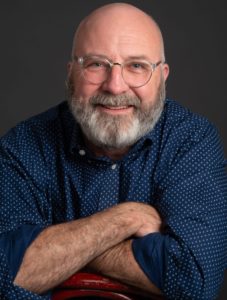We do love simplicity. We love the idea that complex issues can be distilled into easy sound bites, that nuanced conversations can be summarized as “he said/she said” and that internet memes and bumper stickers offer plenty of space to fully express our deepest thoughts.
So surely I can explain everything that’s wrong with the world today in this 1,300-word column. If only it were that simple.
And therein lies one of the big things that’s wrong with everything in the world today — oversimplification. But even that’s not so easy to pin down because often the very people who fall victim to oversimplification believe they are the ones who have done exhaustive research and engaged in critical thinking when, in fact, they have done neither. They’ve merely searched out simple answers that fit their preconceived hopes and ideals.

Mark Wingfield
For example, reading multiple articles on an anti-vaxx website or affinity group is not research; it’s indoctrination. Neither is listening only to your echo-chamber friend group or consuming only one news source. There’s a difference.
While our quest to dumb down everything to the lowest common denominator or make of everything five-points lists worthy of the internet is indeed a problem, it is not the root problem with everything that’s wrong with the world today.
Yet I propose that the root of all evil in modern society is still quite easy to name. It is selfishness.
Call this illness what you will — being self-centered, myopic, closed-minded, self-protecting, unthinking, unchangeable, inwardly focused, nationalistic, racist, bigoted, whatever — but the reality is the same. It is the sin of seeing the world only through our own lenses and assuming everyone has the same experiences as us, that everyone has the same advantages or disadvantages as us, seeking to protect our self-interests above all.
Most people don’t set out to be self-centered or myopic. We get this way because our hearts grow hardened, our perspectives get blinded and our willingness to process new information gets locked down.
The summer between my fourth and fifth grade year, our family moved from a 9,000-person town in central Oklahoma to the fastest-growing city in America at the time, a southern suburb of Oklahoma City. We joined the large and growing First Baptist Church in that town, where — for the first time in my 10-year-old memory — my parents joined a church bowling league.
Every Tuesday night, I would sit at the back of the bowling alley, eat cheap beef tacos from the Del Taco nearby, and watch the bowling action. I noticed a lot of other adults from our church there and, in the imagination of my young mind, I assumed that at this new church, all parents played on a church bowling league. From my sample size of one, I extrapolated to the whole. (OK, so they weren’t teaching us statistics in fifth grade.) I had a self-centered view of the church and the community — but that didn’t mean I also had to have a selfish view.
“We all by human nature begin with self-centered views of the world — the world as we know it. That is not inherently evil.”
Here’s the point: We all by human nature begin with self-centered views of the world — the world as we know it. That is not inherently evil. Refusing to be moved from such a perspective — or especially demanding that others conform to our own experiences and perspectives — is sinful. That is the line that runs between self-centered and selfish.
Think of any of the great problems that plague us today and tell me how they are not rooted in selfishness that began with a self-centered perspective untamed.
Parents who are demanding that public schools not require masks, not teach true American history, not require vaccinations, not talk about racism, not stock certain books in the library, not hire certain kinds of teachers — these are all about taking a personal preference and trying to demand it for everyone. If your child existed in a classroom of one, you might be entitled to dictate the curriculum. And even if your child existed in a classroom of kids only from families who believe exactly as you do, you might be entitled to dictate the curriculum. But that’s not how public education works.
Politicians who gerrymander districts do so because they realize not everyone agrees with their political positions, so they instead selfishly create districts that will ensure they remain in power — even if their views are minority views in the city, state or nation. This is not just a failure to see diversity; it is a purposeful intent to thwart diversity and a competition of ideas. It is rooted in pure selfishness.
“This is not just a failure to see diversity; it is a purposeful intent to thwart diversity and a competition of ideas”
Employers and corporate boards of directors that maximize profits over people do so purely for the selfish purpose of making more profit for themselves — sometimes spouting the now-debunked philosophy of trickle-down economics to justify their greed.
White people who deny the existence of systemic racism do so to avoid acknowledging that they benefit from advantages they assume everyone else could have — “if they just worked hard enough!” — while ignoring the leg up they were given that is rooted in the very selfish attempt to preserve their own position.
Church members who refuse to welcome new people or consider new ideas do so out of the selfish desire to maintain the church as they have known and loved it. I’m reminded of the older adult who said to me during our church’s process toward LGBTQ inclusion: “I know where this is heading in 10 or 20 years, but until then can’t we just have our church the way we’ve known it until we die?”
The TheoBros who use Twitter and denominational mechanisms to police the thoughts, beliefs and behaviors of everyone else do so not to benefit others but to maintain their own selfish control. They not only assume that everyone should believe exactly like them, they demand it. I love the observation of a friend on social media last week: The TheoBros are mainly upset about those who are deconstructing their faith because they can’t control the deconstruction.
“They not only assume that everyone should believe exactly like them, they demand it.”
Opposition to welcoming immigrants and refugees — a worldwide phenomenon — is driven by people who don’t want to give up their space, their control, their majority, their communities to people who neither look nor think like them. And this selfish impulse is so strong that we now see people who once were immigrants themselves vigorously opposing immigration.
This list could go on and on. And in example after example, we could dig down and discover the root problem is a self-centered perspective that has led to selfishness.
Perhaps this is why Jesus talked so much about money: The love of money is the root of all evil. Perhaps this is why Jesus talked so much about forgiving sins: Let him without sin cast the first stone. Perhaps this is why Jesus talked so much about inclusion: Suffer the little children to come unto me. Perhaps this is why Jesus connected love of God with love of neighbor: The greatest commandment is this: Love the Lord your God with all your heart, mind and soul. And the second is like it: Love your neighbor as yourself.
The greatest advancement we could make in this new year, the thing that would do the most worldwide good, the thing most likely to bring peace on earth, the thing that would make us most like God intends us to be is this simple thing: Let us remove ourselves from the center of the equation and see the world as God sees it.
Let there be peace on earth, and let it begin with me — by not being all about me. It really is that simple.
Mark Wingfield serves as executive director and publisher of Baptist News Global.
Related articles:
Three words for the church in 2019: ‘We were wrong’ | Opinion by Mark Wingfield
A wish list for the common good in a new era | Opinion by Marv Knox
Hope for a new year out of the historical disunity of our United States | Opinion by David Jordan


